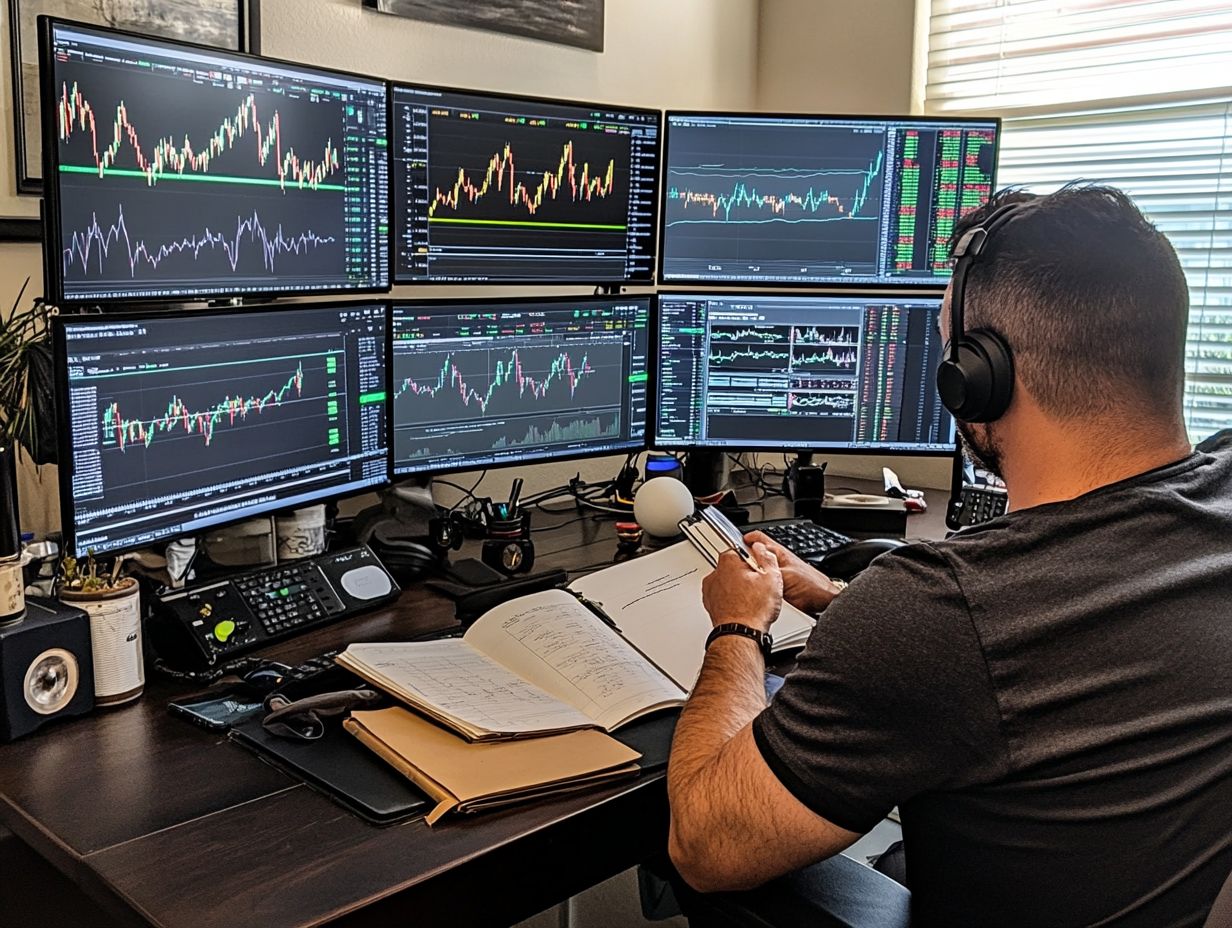The Role of Routine in Trading Psychology
In the fast-paced realm of trading, keeping a calm mind is essential for achieving success. By establishing a well-defined routine, you can significantly enhance your trading psychology, providing the consistency and discipline necessary to adeptly navigate market fluctuations.
This article delves into the nuances of trading routines, showcasing their advantages in reducing stress and handling emotions. You’ll discover practical steps that can transform your trading journey, along with strategies for overcoming disruptions.
Get ready to boost your trading skills with a clear routine!
Contents
- Key Takeaways:
- Understanding Routine in Trading Psychology
- Benefits of Establishing a Routine
- Creating an Effective Trading Routine
- Tips for Maintaining a Trading Routine
- Frequently Asked Questions
- The Importance of Routine in Trading Psychology
- How can routine benefit traders in their trading psychology?
- What are some common routines that traders incorporate into their trading psychology?
- What should traders consider when developing a routine for their trading psychology?
- Can routine help with emotional control in trading?
- Are there any downsides to relying too heavily on routine in trading psychology?
Key Takeaways:

- Consistency and discipline are key factors in successful trading, and establishing a routine can help cultivate these qualities.
- A well-structured routine can help reduce stress and improve emotional management, leading to better trading decisions.
- Creating and maintaining an effective trading routine involves identifying and prioritizing tasks, developing a schedule, and adapting to disruptions to promote consistency and success.
Understanding Routine in Trading Psychology
Recognizing the significance of a daily trading routine is essential for achieving success in your trading endeavors. This routine not only elevates your trading psychology but also profoundly influences your overall trading performance.
By cultivating an effective trading regimen, you can enhance your trading mindset, bolster your emotional resilience, and uphold a disciplined approach to ever-changing market conditions. This routine becomes your foundation for trading strategies, diving into chart analysis (the process of studying price movements on charts), and fine-tuning your trading habits, ultimately paving the way for financial success in the dynamic world of finance.
Benefits of Establishing a Routine
Establishing a trading routine can offer many benefits that can greatly impact your success. By cultivating this practice, you enhance your consistency and discipline in executing trades, which in turn helps to reduce stress levels and improve your emotional management.
A structured approach helps you tackle trading challenges confidently.
Consistency and Discipline
Consistency and discipline are the cornerstones of a successful trading routine, giving you the power to develop effective habits and enhance your overall performance.
When you adhere to a structured plan, you foster a mindset that prioritizes long-term success over fleeting short-term gains. For instance, creating a daily checklist before entering trades allows you to evaluate your strategies objectively, minimizing the risk of impulsive decisions during volatile market shifts.
By maintaining a disciplined approach, you can better regulate your emotions, taking decisive action based on your trading criteria rather than succumbing to fear or greed. This balance between emotional control and methodical execution shines through when you allocate specific times for market analysis and commit to predetermined entry and exit points, irrespective of market noise.
Over time, these practices cultivate confidence and resilience, paving the way for improved results even amid fluctuations.
Reduced Stress and Emotional Management

Implementing a well-structured trading routine can significantly reduce stress and enhance your emotional management two critical elements of effective trading psychology.
By integrating mindful practices into your routine, you can cultivate a more resilient mindset, especially when navigating the market’s unpredictable nature. Consider focused breathing exercises; these serve as a powerful tool to center your thoughts and provide clarity when faced with decision-making in volatile situations.
Maintaining emotional balance is crucial. By recognizing and addressing your emotional reactions to price movements, you can avoid impulsive decisions that might derail your trading strategy. Setting predefined stop-loss orders (limits on how much loss you’re willing to take) helps manage risk and alleviate anxiety during sudden market shifts.
These strategies not only enhance your performance but also foster a sense of calm, giving you the power to take more informed and rational trading actions.
Creating an Effective Trading Routine
Crafting an effective trading routine requires you to identify and prioritize the essential tasks that align with your trading goals.
This structured approach enhances your daily market engagement and guides you toward consistent success.
Identifying and Prioritizing Tasks
Identifying and prioritizing tasks is essential for developing an effective trading routine. This allows you to concentrate on crucial trading strategies and thorough market analysis.
Focus on key components like chart analysis! This will empower you to make quick, informed decisions.
By carefully monitoring support and resistance levels, you can adapt fluidly to the ever-changing market conditions. This ensures you don t miss out on potential opportunities.
When you assign importance to these critical tasks, you enhance your execution. This allows for precise entry and exit points.
This strategic approach streamlines your efforts and builds a solid foundation of confidence, giving you the power to navigate the complexities of the market landscape.
Developing a Schedule and Sticking to It
Developing a schedule and committing to it are essential for maintaining a successful trading routine. This approach ensures you engage regularly with the market and execute trades with discipline.
By strategically allocating time for critical activities like market analysis and trade execution, you significantly enhance your decision-making processes.
Don’t forget to include periods for methods to manage your emotions, such as mindfulness or brief breaks, to help manage stress and maintain your focus.
Flexibility is vital; adapting your schedule to fluctuating market conditions allows you to seize trading opportunities and refine your strategies.
A well-structured schedule fosters accountability and helps you balance the demands of trading with self-care. This ultimately leads to more informed and confident trading decisions.
Tips for Maintaining a Trading Routine

Maintaining a trading routine may be challenging, but it s also incredibly rewarding! By implementing effective strategies to navigate disruptions and routinely evaluating and refining your approach, you can pave the way for sustained trading success.
Dealing with Disruptions
Dealing with disruptions in your trading routine demands a proactive approach. This helps maintain emotional resilience and ensures your trading habits remain intact, even in the face of external challenges.
Consider crafting well-thought-out contingency plans that can be easily executed when unexpected market shifts or personal interruptions arise.
For instance, you might set predefined exit points orders to automatically sell a stock at a certain price to prevent further losses along with stop-loss orders to mitigate losses during volatile market conditions.
Integrating mindfulness practices, such as meditation or focused breathing exercises, can enhance your concentration levels. This allows you to stay calm and focused amid distractions like sudden news announcements or market rumors.
These strategies help you navigate common disruptions effectively and bolster your overall trading performance by fostering a mentally resilient environment.
Evaluating and Adjusting the Routine
Regularly evaluating and adjusting your trading routine is crucial for optimizing your trading performance. This helps you seamlessly incorporate new insights into your strategies.
This proactive approach gives you the power to remain resilient amid market fluctuations. It allows you to adapt to evolving conditions with confidence.
By effectively monitoring your trading results, you’ll gain a clearer understanding of your strengths and weaknesses. This enables you to refine your techniques and make more informed decisions.
Integrating performance metrics into this process not only reveals areas for improvement but also reinforces the effective practices that already serve you well.
Taking the time to weave constructive feedback and thorough market analysis into your routine adjustments cultivates an environment of continuous growth and expertise, ultimately elevating your overall trading success.
Frequently Asked Questions
Start refining your trading routine now and watch your success soar!
The Importance of Routine in Trading Psychology

A solid routine gives structure to a trader’s decisions. It helps build good habits and curbs hasty trading.
How can routine benefit traders in their trading psychology?
Routines ease stress and anxiety. They boost discipline, focus, and maintain a healthy mindset through market ups and downs.
What are some common routines that traders incorporate into their trading psychology?
Traders often set daily and weekly goals. They also follow consistent pre-trading habits and regularly review their strategies.
What should traders consider when developing a routine for their trading psychology?
When creating a routine, traders must consider their style and goals. The routine should be flexible to adapt to market changes.
Can routine help with emotional control in trading?
Absolutely, a routine aids in emotional control. By sticking to a routine, traders can minimize hasty decisions that hurt performance.
Are there any downsides to relying too heavily on routine in trading psychology?
While routines are helpful, being too rigid can be detrimental. Traders must remain adaptable and open to new strategies.






